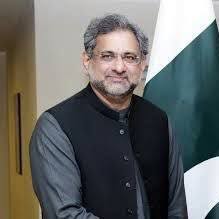Shahid Khaqan Abbasi is a prominent figure in Pakistani politics, known for his leadership, dedication, and extensive experience in public service. A member of the Pakistan Muslim League (Nawaz), Abbasi has held various key positions in the government, including serving as the Prime Minister of Pakistan. His journey in politics is marked by resilience, strategic thinking, and a commitment to the development of Pakistan.
Early Life and Education
Born on December 27, 1958, in Murree, Shahid Khaqan Abbasi hails from a well-established family with a strong political background. His father, Khaqan Abbasi, was a politician and served as the Federal Minister for Production in the government of Zulfikar Ali Bhutto. Abbasi received his early education in Karachi before moving to the United States for higher studies. He earned a degree in Electrical Engineering from the University of California, Los Angeles (UCLA), and later completed a Master’s in Electrical Engineering from George Washington University.
Political Career and Achievements
Abbasi’s political career began in 1988, following the tragic death of his father in the Ojhri Camp incident. He contested and won his first election as an independent candidate, securing a seat in the National Assembly. His affiliation with the Pakistan Muslim League (Nawaz) started soon after, and he quickly rose through the ranks due to his dedication and leadership qualities.
Over the years, Abbasi has held various key positions in the government. He served as the Minister for Petroleum and Natural Resources from 2013 to 2017, where he played a crucial role in addressing Pakistan’s energy crisis. His efforts in the energy sector, particularly in the import of Liquefied Natural Gas (LNG), have been widely recognized as a significant contribution to the country’s energy security.
Prime Ministership
In July 2017, following the disqualification of Nawaz Sharif by the Supreme Court of Pakistan, Shahid Khaqan Abbasi was elected as the Prime Minister of Pakistan. His tenure, though brief, was marked by stability and continuity in governance. Abbasi focused on continuing the development projects initiated by his predecessor and worked towards strengthening Pakistan’s economy.
During his time as Prime Minister, Abbasi made significant strides in infrastructure development, energy projects, and improving the country’s international relations. He also took steps to enhance Pakistan’s technological capabilities, with a particular focus on the IT sector.
Challenges and Controversies
Like many political figures, Shahid Khaqan Abbasi’s career has not been without challenges and controversies. His involvement in the LNG deal, though instrumental in addressing the energy crisis, has faced scrutiny and legal challenges. Despite these hurdles, Abbasi has maintained his stance, defending the transparency and necessity of the decisions made during his tenure as Minister for Petroleum.
Legacy and Impact on Pakistani Politics
Shahid Khaqan Abbasi impact on Pakistani politics is undeniable. His approach to governance, marked by pragmatism and a focus on long-term development, has left a lasting impression. He is seen as a leader who prioritizes national interests and is committed to serving the people of Pakistan.
Abbasi’s work in the energy sector, particularly the LNG project, continues to benefit the country. His contributions to infrastructure and technological advancements have also set the stage for future growth. As a seasoned politician, his influence in the Pakistan Muslim League (Nawaz) remains strong, and his opinions are highly respected within the party and beyond.
Explore more by clicking this link.


